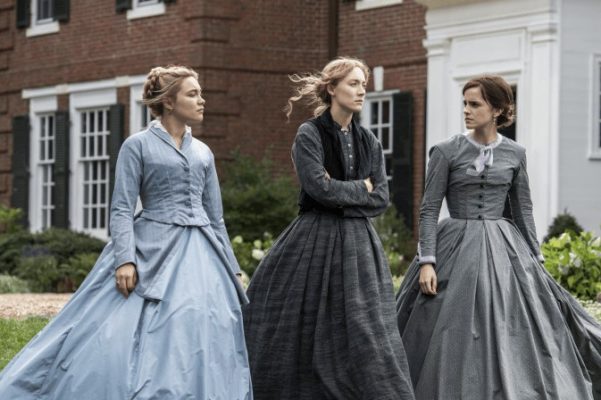It says much about the rapture with which Greta Gerwig’s new adaptation of Little Women has been received, that any grumbles about a classic being strip-mined for cinematic material once again were rapidly silenced. This may be the eighth direct interpretation of Louisa May Alcott‘s iconic coming-of-age tale, but a quietly radical restructuring of the plot and perhaps the best ensemble cast of any film this year ensure it avoids any sense of over-familiarity. The only stumbling block may be mild disappointment caused by over-hype, but Gerwig’s take is likely to delight old devotees and new acolytes alike.
Little Women 2019 remains the story of the March sisters as they grow from teenagers to young adulthood in Massachusetts at the end of the American Civil War. Gerwig, however, rejects the chronological storytelling of previous versions and instead flits freely between the two time periods. This allows a different perspective on its themes and characters, yet very much retains the spirit of Alcott’s writing. The earlier period is bathed in rich Summer tones while contemporary scenes are more muted, even chilly. This not only offers swift visual orientation but subtly undercuts any resort to cosy nostalgia. The past isn’t always happier, and experience and wisdom aren’t always bitter.
Saoirse Ronan heads the cast as Jo March, the surrogate for Alcott, and for Gerwig herself (as she was in Gerwig’s debut, the excellent Lady Bird). With her slightly bossy nature and her love of writing, there is more than a little of Ronan’s breakthrough role of Briony Tallis in Atonement to the young Jo, albeit with none of the malevolent jealousy. Gerwig is also keen to bring the other March sisters to the fore in a way that enriches the film (thanks to lovely performances from Florence Pugh, Emma Watson, and Eliza Scanlen) but deepens the theme of women’s place in society and their engagement with art on an idealistic, or a pragmatic one. Whether the level of autonomy each of these young women has is anachronistic to the period is arguable, but for the most part, they get to choose love, marriage and career on their terms. Refreshingly, they aren’t judged for their choices.
Some of the rougher edges of Alcott’s story are also smoothed out, particularly in the case of Amy (Pugh) whose occasional spitefulness is slightly glossed over, or easily resolved through the split-time structure. The cantankerous old Mr Laurence (Chris Cooper) is also here recast as a beacon of Jarndyce-level magnanimity. The additional framing device of Jo presenting the manuscript of the March’s story to an incredulous publisher (fellow Lady Bird alumnus Tracey Letts) is also a slight case of Gerwig having her cake and eating it. She gets to indulge in the traditional romantic crowd-pleasing finale while having a postmodern little grouse at the expectation.
In every other way, Little Women is nothing short of triumphant. It’s witty, good-hearted, beautifully paced, and slightly self-indulgent in the best possible way. There’s something about the oft-maligned ‘Mumblecore‘ movement in indie film that lends itself to beautifully-tuned updates on classic texts; perhaps a dramatic irony that refuses to be slavish to esteemed sources but captures their essence. In many ways, it could be a companion piece to Whit Stillman‘s Love & Friendship which reimagines Jane Austen‘s characteristic tales of manners as something approaching Georgian Screwball. With Armando Ianucci‘s anarchic take on David Copperfield and Autumn de Wilde‘s new version of Emma to follow in the new year, there seems to be a developing trend that is surprisingly welcome. If the releases to come are anything like as good as Greta Gerwig’s spirited, empathetic and brilliant revision of a literary icon, 2020 is going to be an excellent year.
@Filmhouse, Edinburgh from Fri 27 Dec 2019
